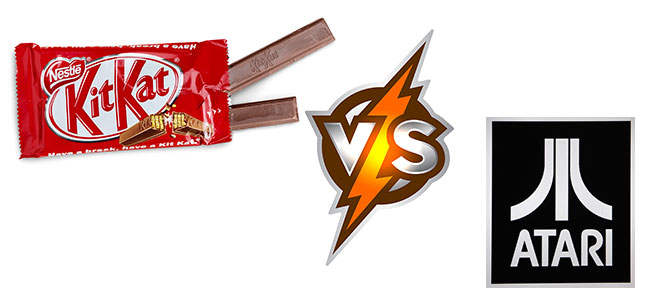Intellectual property is in the news again this week. Atari, an iconic video game company, sued Nestle, alleging that Nestle committed IP infringement on its classic “Breakout” video game by using Breakout to sell Kit-Kat bars. The lawsuit is a great excuse to look at some historical video game trivia and to see how IP rights are used by some of the world’s biggest companies.
Atari and Nestle are both sophisticated companies with extensive IP holdings. Atari, of course, owns trademarks and copyrights related to its video games, ranging from software to artwork to the games themselves. Nestle owns copyrights and trademarks for dozens or perhaps even hundreds of consumer brands. At first glance, however, there seems to be little in common between the two portfolios. So how did Atari end up suing Nestle? To explain that requires a little background information.
The Video Game: Breakout
Founded in 1972, Atari was one of the first video game companies in the United States. Its early success was built on Pong, a table tennis video game that itself fell victim to what may have been the first patent infringement lawsuit over video games.
Not long after Pong, Atari developed its successor Breakout. Breakout can be thought of as a single-player Pong. The game begins with eight rows of bricks, with two rows each in four colors. Using a ball and paddle, the player must knock down as many bricks as possible. In a nice bit of understatement, the Complaint notes that “two little known but up-and-coming developers–Steve Jobs and Steve Wosniak–created Breakout for Atari.” Jobs and Wosniak used the money they earned developing Breakout to found Apple. Breakout went on to become very successful, and is still available today. According to the complaint, over 2 million copies of Atari’s iPhone version of Breakout have been downloaded.
The Commercial
Fast-forward forty years. Nestle, which owns the Kit-Kat brand, aired a Kit-Kat commercial showing a group of people playing Breakout. The bricks, however, had been replaced with Kit-Kat bars, which as it happens do resemble the bricks in the game. As Atari alleges, Nestle “simply took the classic Breakout screen, replaced its bricks with KIT KAT bars, and invited customers to ‘Breakout‘ and buy more candy bars.”
The commercial only aired in the United Kingdom. However, it appears to have also been available in the United States via the Internet. Unfortunately, all of the copies of the commercial that were available online appear to have been taken down.
The Lawsuit over IP Infringement
Atari owns and has registered trademarks and copyrights related to the Breakout game. For example, it owns Registration No. 2553961 for “BREAKOUT” for computer game programs and video game cartridges. It also owns numerous Breakout-related copyright registrations, including copyrights on the source code, the sounds and graphics, the packaging, and the instructions, among others.
According to the Complaint, the Kit-Kat ad “blatantly pilfered Atari’s mark and/or the look, feel, sound, and imagery of Breakout” by depicting “imagery of the Breakout game which is covered and protected by Atari’s valid registered copyrights,” with the only difference being replacing the Breakout bricks with Kit-Kat bars. The Complaint contains counts for many counts of IP infringement including, trademark infringement, copyright infringement, false designation of origin, dilution, and for violations of state unfair competition laws.
Atari alleged that its damages include, at a minimum, lost licensing fees; it also claims that its image has been tarnished by the association with Nestle, which it portrays as a perpetrator of child labor violations, consumer endangerment, pollution, and a litany of other wrongdoing. One can only assume Nestle will have a forceful response to those allegations.
The Takeaway about IP Infringement
Other people will no doubt weigh in on the strength or merits of Atari’s claims. But to me, the lawsuit is a reminder of the importance of (1) protecting your intellectual property, and (2) being careful not to infringe on the intellectual property of others. I’m not sure to what extent Atari is still developing new content. Nevertheless, Atari is in a position to sue here because, over the decades, it made the investments in building and protecting the Breakout IP. Nestle, on the other hand, is on the receiving end of an expensive lawsuit because it either failed to notice some fairly obvious IP issues with the commercials, or noticed them but concluded they were not problems. Only time will tell which company made the correct decision.
Your business probably does not have the same intellectual property problems as an Atari or a Nestle. But its basic needs are the same: developing IP rights, enforcing them, and avoiding infringing the rights of others. The Atari/Nestle lawsuit makes for entertaining news, and an excuse to write a fun blog article. But it’s also a reminder that intellectual property is a key part of every business. If you haven’t done so lately, now might be the time to assess whether you are protecting your IP adequately, and whether you have adequate mechanisms in place to ensure you aren’t using someone else’s IP without permission, potentially setting yourself up for a lawsuit.
Law 4 Small Business, P.C. (L4SB). A little law now can save a lot later. A Slingshot Company.

